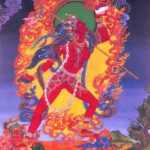Two or four day Vajrayogini retreat
Thursday 5 January to Sunday 8 January 2023 During this retreat we will study and deepen the practice of Vajrayogini. This time, special attention is paid to the symbolism of Vajrayogini. What do its various symbols mean, why do we use them? We will try to make this our own by means of meditation sessions. […]
Continue reading →Patience and enthusiasm
In a world full of big and small personal and global conflicts, we look for wisdom and practical tools to deal with conflict in a beneficial, positive and helpful way. Tibetan Buddhism offers a range of proven tools for this and shows how we can train ourselves to use these tools in difficult situations in […]
Continue reading →Summer retreat: Yamantaka
This year we again offer the opportunity to do a Vajrayana rapprochement retreat: From August 5th through August 18th we will host a Yamantaka Solitary Hero retreat at our lovely Jewel Heart Center. On August 19, as usual, we finish the retreat with a fire puja. Those who complete the retreat are authorized to perform […]
Continue reading →The King of Prayers (En)
Glenn Mullin This afternoon, in his usual cheerful way, Glenn Mullin will shed light on ‘The King of Prayers’. Glenn Mullin is a renowned translator of Tibetan buddhist texts. He has also translated this prayer into English. This prayer is considered exceptional because it encompasses the entire teachings of Buddha. “Every time I read these […]
Continue reading →Lesson “ The Sixth Paramita: Wisdom” by Demo Rinpoche 15 September 2022
This is the last lesson from Shantideva’s series of lessons on the six paramitas. Rinpoche will explain to us how we can understand wisdom within Tibetan Buddhism. All paramitas are related to each other. Wisdom is also associated with generosity, morality, patience, enthusiasm and concentration. This lesson can also be taken separately from the previous […]
Continue reading →Teachings “The Jewel Garland” in Sept./Oct. by Venerable Thubten Chödron
The Jewel Garland was written down in Tibet by Atisha ((Dipamkara Atisha 982-1054), in response to questions from his student Dromtopa. It is a short and concise poetic text and stands in the tradition of mind training, called Lojong. The verses carry advice and instructions that can be just as powerful and helpful today in […]
Continue reading →




